For a bloke who has spent 23 years wandering the world making internationally popular TV car shows - Richard Hammond seems remarkably well adapted to the wilds of Worcestershire.
For more than a decade, he has lived near the market town of Ross-on-Wye but is rapidly becoming better known in the area for a classic car restoration business called The Smallest Cog, established in 2021 on an industrial estate outside Hereford, half an hour from his home.
And for the TV programme Richard Hammond’s Workshop that it has spawned - one of several that have become internationally recognised.
The Smallest Cog was born when a local car restoration team – Neil Greenhouse, son Anthony and brother Andrew, who had done an excellent job of looking after Hammond’s classic car collection for half a dozen years – suddenly lost their rented premises in Hereford.
Not wanting to lose his technician-friends, Hammond suggested they set up a business that would take in outside classic car work as well as continuing to do his own work. That led to the launch of the Discovery TV programme, now heading for its fourth series.
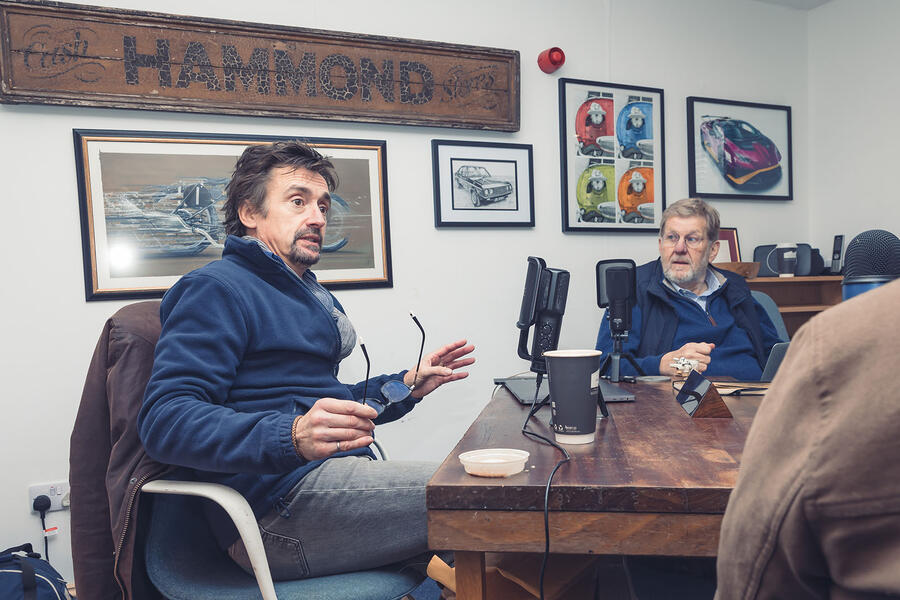
Away from TV, Hammond had always held a desire to have his own car restoration business, which is why he was prepared to sell prime models (a Jaguar E-Type and a pristine Bentley among them) to fund The Smallest Cog’s modern premises that now include latest-spec car lifts, fettling bays and a state-of-the-art paint booth.
There’s even a new mezzanine floor with space for spares, a production office for the TV people and Hammond’s own modest office – into which seven of us crowded one December morning.
Matt Prior and I had come to record, with Hammond’s help, the Christmas edition of our podcast, My Week In Cars.
We had our own cameramen (one stills, one video) and two more cameramen were on hand from Hammond’s side to record stuff for the Discovery programme: they wanted to use some clips of us chatting. Hammond, used to the mayhem of setting up, grinned and chatted.
So many bodies soon warmed the little office even though it was a brisk morning and the downstairs workshop doors were open because The Smallest Cog’s workshop crew were ending a successful year with a three-day clear-out.
One of their achievements had been a Nice Try Award for Hammond’s 1962 Opel Kadett (known widely as Oliver) at the 2023 Festival of the Unexceptional but we were soon to learn that his ambitions extend much further than that.
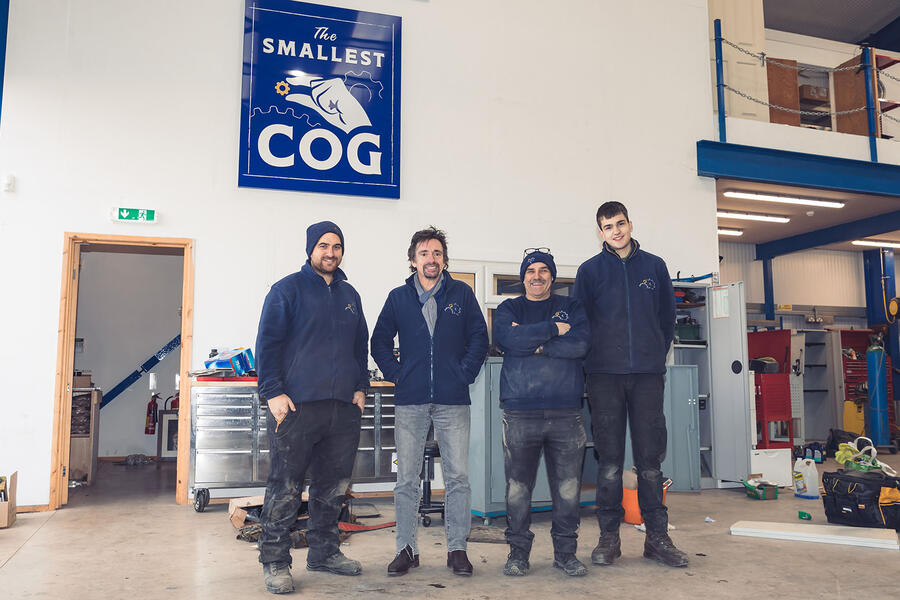
“We’ve never done anything really proper. We want to make our work perfect, but we’re usually constrained by the budget of the owner,” says Hammond.
“But I am keen to make a perfect show car, something that will be able to grace the lawns of a Hampton Court Palace concours in the summer, so we’re planning to rebuild one of my cars, a Ford Escort RS2000.
"I want it to be a proper, no-compromise machine, something the organisers invite because the restoration is perfect, not because it belongs to some bloke off the telly. And the skills to build cars like that are what we have here.”
Like his Grand Tour pals, Hammond lives a life of clever, cheery wisecracking but you still get the impression very early on that The Smallest Cog’s serious purpose is cars, not entertainment.
“The TV show just happens around the work,” says Hammond. “You have to be deadly serious about the cars because you’re taking people’s money and you’ll be judged on the quality of your work. Those guys downstairs are top-class technicians, not actors.”
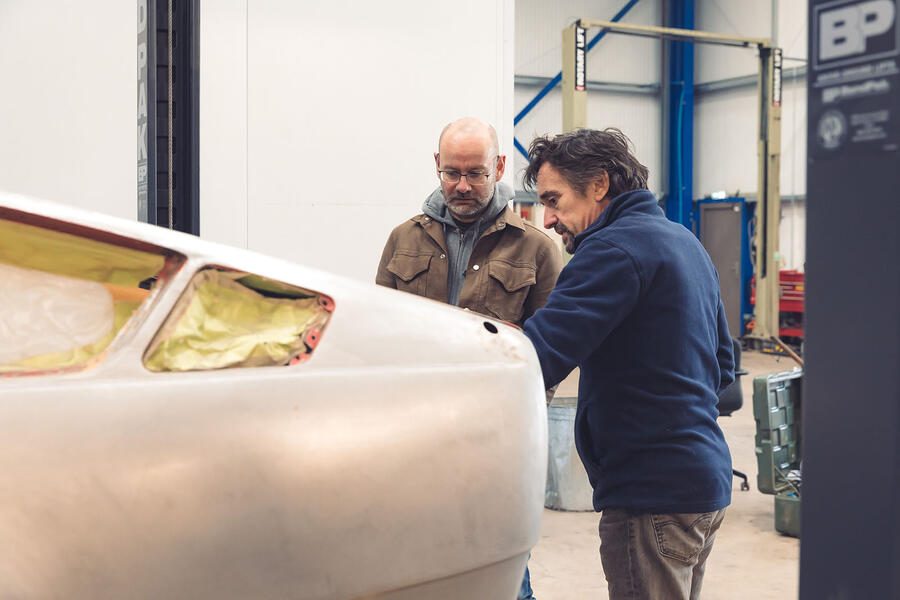
Classic car projects arrive from people simply pitching up at the workshop door, says Hammond, or via his website.
“We’ve got enough work to fill this place for the next three years,” he says, “which is why I think it needs to be bigger.”
Would he stay local? “Of course” comes the positive answer.
“I love Worcestershire. It’s far enough away from London not to empty out every Monday morning.”
Endearingly, Hammond argues the merits of all cars, not just classics. And handily for the car lobby, he does it with as much eloquence as passion.
“We need our homes for shelter,” he says, “and everything else we have to go out and get. When we created a machine to help us do that, it was the most important invention of all. So cars aren’t going to stop, but they will change.
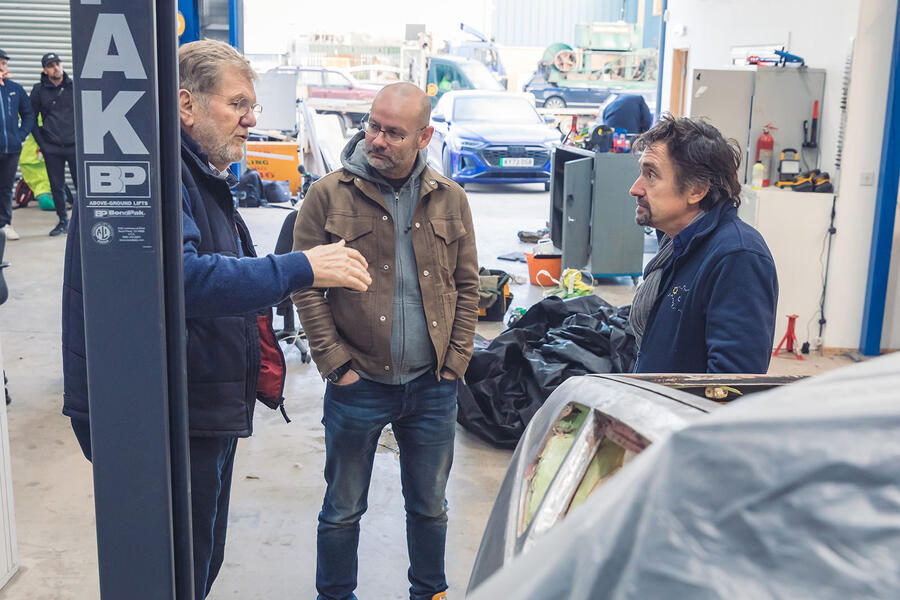
“We’ve got to welcome the future. Things are going to have to change, and it’ll be engineering that saves us. We have to be open to a variety of solutions – repurposing cars we’ve already built, embracing hydrogen fuel cells and hydrogen combustion and making a success of hybrids, as well as building and selling lots of electric cars. There isn’t enough lithium in the world for all future cars to be battery-electric.”
Hammond has a particular interest in sustainable fuels and displays detailed knowledge about their cost and development. “The combustion engine never damaged anything,” he insists.
“It’s the fuel. If that can be made sustainably and to scale – and the signs that it can be are better than even a year ago – then a decent slice of the world’s 1.4 billion cars can stay on the road, and blokes like me can restore them.”
We have arrived on the very day The Times has announced the end of The Grand Tour, the epic TV extravaganza Hammond, Jeremy Clarkson and James May have made over the past five series and six years.
Newspapers insist the final series has been filmed in Zimbabwe, but in a moment of near seriousness Hammond refuses to confirm it. One of the wilder suggestions going around seems to be that The Grand Tour’s backer, Amazon, possibly in cahoots with the BBC, may be thinking future Top Gear thoughts. Hammond is mute; not even a smile.

From an early age, Hammond wanted to be a broadcaster. Before TV, he had a 10-year career in local radio as a journalist and presenter. “I was quietly starving,” he says, “so I took a job in the Renault UK press office, to get to know the editors of TV car shows.”
That led to a sporadic involvement with Granada’s Men and Motors and eventually to a Top Gear audition.
Along the way, he remembers being “very cross” because BTCC star Jason Plato beat him to a presenter’s gig on Channel 4’s then new programme Driven.
“I was upset because I’d already trained as a journalist and TV presenter,” he says. “If you wanted someone to land a jet aircraft, you wouldn’t ask a dentist, would you?”
The world changed in 2000, while Hammond was living in Cheltenham. His agent rang to say he had been offered a chance to pitch for the revitalised Top Gear. “She said I wouldn’t get it,” he recalls, “but that I should still go along to meet their team.
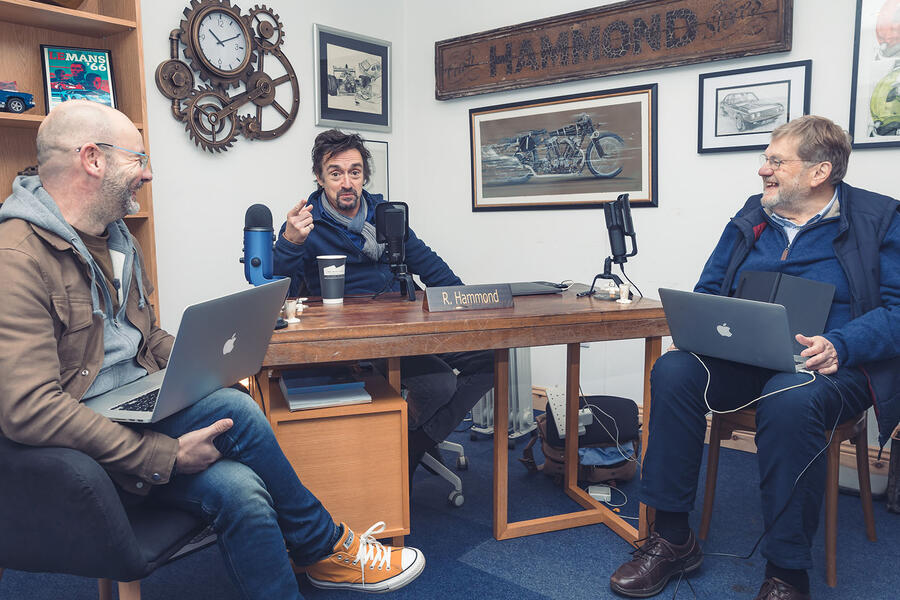
“My wife and I had just learned we were going to have a baby, so I’d swapped my much-loved Fiat Barchetta for a four-seater, a ratty old Porsche 911 SC that was permanently in danger of exploding. But I drove it to meet Jeremy [Clarkson] and Andy Wilman, the TG producer. They saw it and thought I was, well, real.
"I did my stuff with Jeremy and then it was time to go, so I told them I’d better head back to ’Nam, which was my word for Cheltenham. They thought that was funny. In fact, they reckon it’s the reason I got the job.”
And now for Hammond on...
Friendship with May and Clarkson
“We’re friends, of course. If we spent any more time together, we’d have to start living in the same house. Of course, we argue sometimes, but everyone argues. We argue in the programme. That’s part of it. But we’re in touch. I was talking to James this morning, just before you arrived. My ambition is to be barred from his pub in Wiltshire.”
Goals for the next five years
“I want The Smallest Cog to be bigger. I want our restored cars to be requested at the best car shows for their quality. I want these shelves in my office to be covered with ‘best in show’ awards. Most of all, I want to be doing what I’m doing now, being part of it all.”
Fixing catastrophic TV damage “overnight”
“There’s no mystery. We do it ourselves. We just stay up all night… Actually, it’s a mixture. We have crew, of course, but we also have to muck in at times. I once welded a Subaru wishbone back into a fit state on my own. But as for ‘overnight, we built a bridge’, you can draw your own conclusion.”
His own cars
“My daily is a Ford Ranger Wildtrak. I’ve got a Porsche 911 GTS convertible, an old-shape Land Rover 110 breathed on by Bowler, a Subaru WRX STi I drove on The Grand Tour, plus a couple of other Grand Tour cars I can’t talk about.
"I’ve got a ’62 E-Type OTS convertible and another ’62 E coupé in bits that needs a full restoration. There’s the ’67 Ford Mustang GT 390, too – and, of course, there are the bikes. Quite a lot of those. I enjoy the freedom.”
The importance of knowing what you’re talking about
“There has never been a more important or exciting time for automotive journalism. People need to hear from journalists with knowledge and authenticity at a time of huge change like this. The only way that could change is if we modified our lives so that we didn’t move around any more.”
Unscripted events in TV shows
“We plan a lot. You can’t just head for Burma hoping something funny happens. But things do happen. One time in Scotland, Jeremy’s car was passed by a caravan he was supposed to be towing. It wasn’t planned. It just happened. That was a great moment. And I inadvertently sank somebody’s fishing boat. Different stuff had been scripted on those days, but we just chucked it away.”
Coping with the reaction when you’ve been rude about a car
“I hate it. I used to enjoy causing trouble in school, but now I don’t. The others love it, for sure. They really enjoy looking for trouble and they often find it. Me, I try to stay away.”

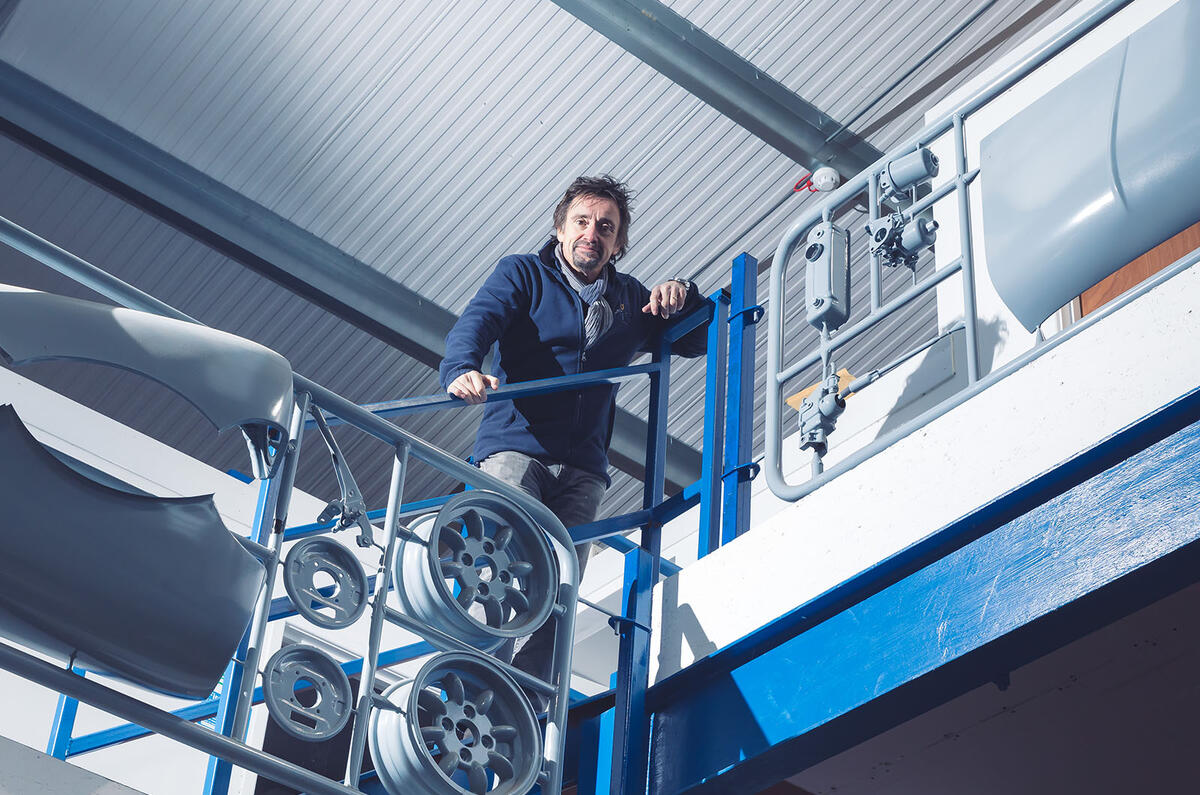






Join the debate
Add your comment
Manga has become a global phenomenon. Translations are available in dozens of languages, and conventions like Comic-Con and Japan Expo celebrate manga culture. Western creators now draw inspiration from manga’s pacing and aesthetics. Manga has influenced fashion, gaming, and even cinema—The Matrix owes much to Ghost in the Shell อ่านมังงะ
It took me a little while to read all of the comments, but I found the article to be quite intriguing. abonnement iptv
With growing tourism, responsible photography has become crucial. Ethical tours emphasize respecting local privacy, Morocco Photography Tours supporting communities, and protecting wildlife. Many Morocco photo tours collaborate with eco-lodges and local guides, ensuring that tourism benefits the people and places being photographed.